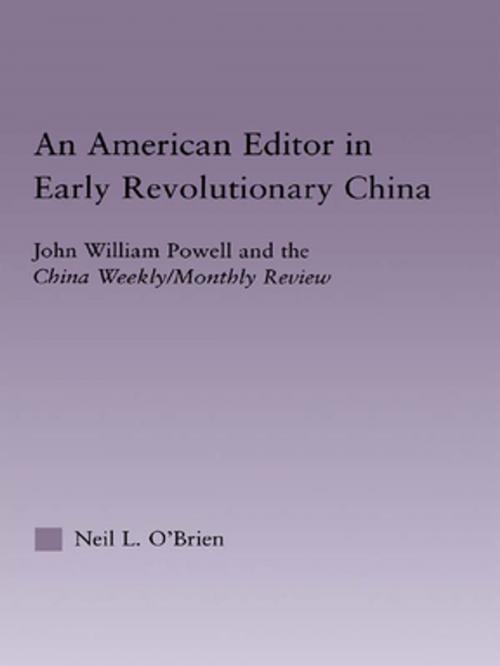American Editor in Early Revolutionary China
John William Powell and the China Weekly/Monthly Review
Nonfiction, History, Asian, China, Social & Cultural Studies, Social Science| Author: | Neil O'Brien | ISBN: | 9781135945718 |
| Publisher: | Taylor and Francis | Publication: | March 1, 2004 |
| Imprint: | Routledge | Language: | English |
| Author: | Neil O'Brien |
| ISBN: | 9781135945718 |
| Publisher: | Taylor and Francis |
| Publication: | March 1, 2004 |
| Imprint: | Routledge |
| Language: | English |
This is a study of Sino-American relations and the editorial policy of the China Weekly Review / China Monthly Review , published in Shanghai by John William Powell during the Chinese Civil War and the Korean War. The Review supported US attempts in early 1946 to avert civil war through the creation of a coalition government. By 1947 it reflected growing disillusionment with Guomindang policies, and increasing sympathy for the demands of impoverished students and faculty for multi-party democracy and peace. As the Civil War shifted in favour of the Communists in late 1948, Powell and the Review counseled US businessmen to remain in Shanghai and urged the US government to establish working relations with the Communists, and later to recognize the new regime. Staying in Shanghai to report changes engendered by the Communist victory, the Review 's staff accomodated themselves to the new orthodoxy and to the regime's coordination of the press. During the Korean War, the Review opposed the expanding US air war, becoming the foremost American purveyor of Chinese and North Korean allegations of American use of bacteriological weapons. The Review was also utilized for the political indoctrination of US prisoners-of-war by the Chinese and North Koreans. After closing the Review in July 1953 and returning to the United States, Powell, his wife Sylvia Campbell and assistant editor Julian Schuman were put on trial for sedition. As the government narrowed its focus to the bacteriological warfare issue, Powell and his lawyers countered by trying to prove the veracity of the charges, seeking witnesses in China and North Korea. Adverse publicity led to a mistrial in January 1959 and limitations in both the sedition and treason statutes ended plans to renew prosecution. Powell and the Review had insisted that positive diplomatic and economic relations between China and the United States were both possible and desirable. The gradual normalization of trade, investment and political relations since the 1970s seemed to validate this belief. In the post-Cold War age when Sino-American relations are often strained and tempestuous, this book serves as a reminder of the value of making the extra effort to achiece understanding.
This is a study of Sino-American relations and the editorial policy of the China Weekly Review / China Monthly Review , published in Shanghai by John William Powell during the Chinese Civil War and the Korean War. The Review supported US attempts in early 1946 to avert civil war through the creation of a coalition government. By 1947 it reflected growing disillusionment with Guomindang policies, and increasing sympathy for the demands of impoverished students and faculty for multi-party democracy and peace. As the Civil War shifted in favour of the Communists in late 1948, Powell and the Review counseled US businessmen to remain in Shanghai and urged the US government to establish working relations with the Communists, and later to recognize the new regime. Staying in Shanghai to report changes engendered by the Communist victory, the Review 's staff accomodated themselves to the new orthodoxy and to the regime's coordination of the press. During the Korean War, the Review opposed the expanding US air war, becoming the foremost American purveyor of Chinese and North Korean allegations of American use of bacteriological weapons. The Review was also utilized for the political indoctrination of US prisoners-of-war by the Chinese and North Koreans. After closing the Review in July 1953 and returning to the United States, Powell, his wife Sylvia Campbell and assistant editor Julian Schuman were put on trial for sedition. As the government narrowed its focus to the bacteriological warfare issue, Powell and his lawyers countered by trying to prove the veracity of the charges, seeking witnesses in China and North Korea. Adverse publicity led to a mistrial in January 1959 and limitations in both the sedition and treason statutes ended plans to renew prosecution. Powell and the Review had insisted that positive diplomatic and economic relations between China and the United States were both possible and desirable. The gradual normalization of trade, investment and political relations since the 1970s seemed to validate this belief. In the post-Cold War age when Sino-American relations are often strained and tempestuous, this book serves as a reminder of the value of making the extra effort to achiece understanding.















